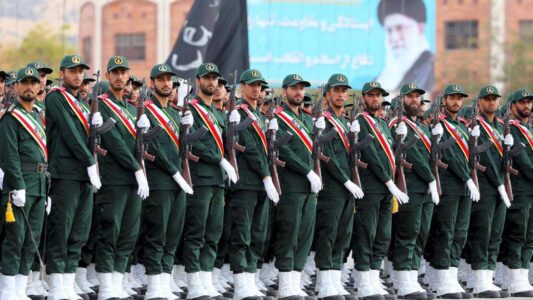
UK government criticised for failure to designate IRGC as terrorist group
UK authorities were criticised for failing to designate Iran’s Islamic Revolutionary Guard Corps as a terrorist organisation despite the “pain and suffering” it has caused in the Middle East.
Tom Tugendhat, chairman of parliament’s foreign affairs committee, said it was disappointing the government had not offered an alternative to the 2015 nuclear deal between Iran and world powers, an agreement from which the US withdrew under Donald Trump’s presidency.
Mr Tugendhat referred to the government’s response to the committee’s report on Iran, published in December, in which MPs called for the IRGC to be designated as a terrorist organisation. The report said its “philosophy and malign actions within Iran and across the region run counter to the interests of the UK and those of the Iranian people”.
The UK government pointed out that the IRGC was under sanction but refused to say whether proscribing the group was under consideration.
“Unfortunately, although receptive to the recommendations of the committee, the government falls short of making concrete commitments,” Mr Tugendhat said.
“The IRGC’s actions consistently meet the criteria of a terrorist organisation. Their role sowing the seeds of instability and causing pain and suffering throughout the region should not be ignored. I remain hopeful that the government will follow our recommendation on the proscription of the IRGC.”
The report recommends a long-term replacement to the 2015 accord, officially known as the Joint Comprehensive Plan of Action, introduced to limit Iran’s nuclear capabilities.
Since Mr Trump withdrew the US in 2018 and imposed sanctions on Iran, Tehran has responded by breaking the conditions of the deal repeatedly, raising questions over its long-term viability.
Mr Trump’s successor Joe Biden signalled the US would return to the deal should Iran be prepared to comply.
The UK government rejected claims it wanted to “replace” the accord, but said it was “not perfect” and “not designed to address the full spectrum of regional security issues”.
“However, before the US withdrawal in 2018 and Iran’s systematic non-compliance began in 2019, it did successfully address our nuclear concerns. As we look forward, both Iran’s nuclear programme and its destabilising behaviour in the region need to be addressed,” the government said.
It would not be in the UK’s interests to terminate the nuclear deal and provide an alternative, the government said, and it will work with Germany, France and the US to preserve the agreement and address regional security concerns. However, Mr Tugendhat renewed the call for a new deal.
“It is disappointing that the Government has not committed to fostering a replacement to the JCPOA as some seem to believe the agreement, now severely undermined, is the answer. The UK is uniquely placed to take a leading role in negotiating a new deal that delivers peace and prosperity for the Iranian people,” he said.
He condemned Iranian hostage-taking and human rights violations.
“While the UK’s use of the UN and international forums to criticise the detention of citizens is positive, we could do more. The government must send a clear message and condemn the Iranian state for blatant and brazen hostage-taking,” Mr Tugendhat said.
“The real victims of the Iranian state are the Iranian people, who suffer intolerable human rights abuses at the hands of their own government.”
Source: The National News





